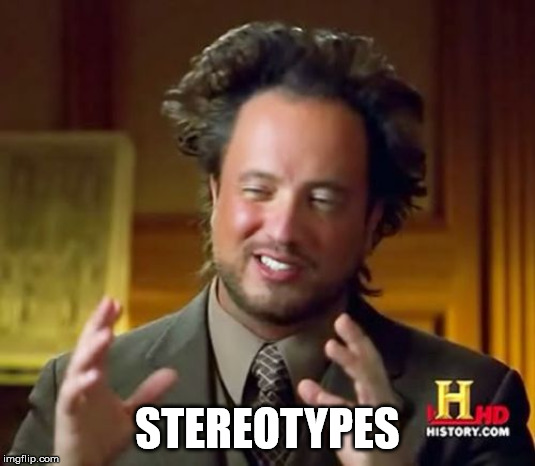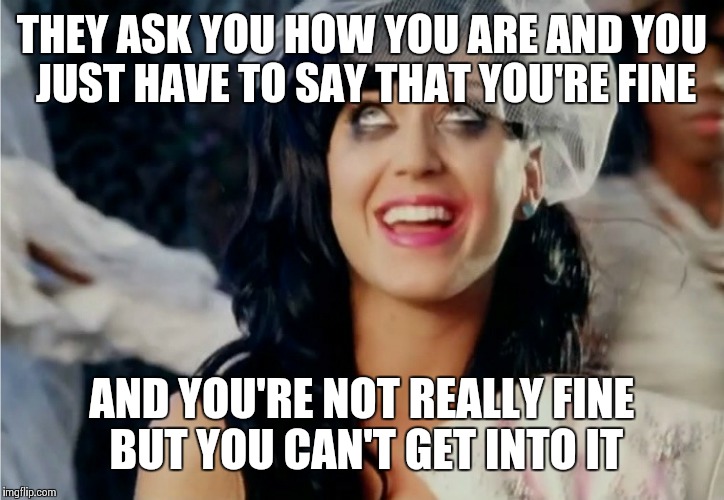Meaning
a fixed idea or image that many people have of a particular type of person or thing, but which is often not true in reality.
Oxford Learner’s Dictionary
Stereotypes is when you process information by categorising concepts based on groups of people/things. It may be categorised based on their race, sexual/gender orientation, appearance, wealth, etc-era.
Discussion
Stereotyping has always had a negative connotation around its meaning. Simply because, not everyone will have traits of their stereotypes and stereotypes will not necessarily represent a group of people/things. Stereotyping may not always be accurate and, to say the least, hurtful to yourself and others.
By categorising concepts are simply based on what you have hear, seen or experienced, thus, errors are bound to be made within judgement due to the lack of information. (No one is equipped with the knowledge of all.) And this will lead to the inaccuracy concept.
Hearing another person presume things about you simply based on stereotypes can be off-putting to hear and, if you hear it all too much, frustrating. As the exposure of the internet increases, good-willed campaigns and causes are being promoted. However, it may also increase how third-parties (such as media) influenced a uprising in prejudice/discrimination against others whom we have never even met before. Being biased against someone due to stereotypes can cause you to act in a certain way (rude/nice) depending on what categorical concept you have them under.
As said earlier, stereotyping has earned a bad reputation for itself. Some argue that there is the existence of ‘Positive’ stereotypes. Though, it might not be so positive after all. It can cost an individual to perform well. We all know the typical stereotype, Asian is good in math or basically everything academically. This is not affects the way others will perceive us, but also how you perceive yourself. This may cause individuals to be alienated or depressed as they may not possess the qualities they are “supposed” to have. If an individual does not live up to “positive” stereotypes, they may feel like they have failed in one way or another.
Here’s an example of stereotypes. Something we might all be familiar with, Singapore’s location stereotypes. (Hopefully it will make it a little more easier to understand the concept of stereotypes)

These are just some of the stereotypes of Singapore’s finest areas. (May be a little outdated .. 3 years ago …) I’m sure we are all familiar with some of the stereotypes given! Try to spot where you stay! I stay just in between Book In and Airport. LOL. (Quite far from school … )
Of course, certain areas are straightforward and have no stereotypes such as NUS/NTU or Bukit Timah Hill. Some are just well known for their delicacy or establishments such as Blk 85 BCM or Zouk. And some are just stereotyped in a certain way, most popularly, Yishun.

But in reality, not everyone in Yishun is a murderer or a crazy person. These people can exist anywhere or be anyone in the world! Just a simple example of how stereotypes work.
Personal Experience & Implications
Right now, presenting one of the latest memes in topic of stereotyping. As many of you would know about the Corona-virus, Wuhan Virus, going around.
As many would know the stereotype of how items, manufactured in China, are supposedly claimed to be of lower quality, or prone to breakage/damage at an early stage. The joke implies that the Corona-virus will come to an end soon because of that stereotype people have against China manufactured products. (This virus is no laughing matter though, I’m genuinely afraid. Please protect yourself, don’t infect us in class. Please.)
Despite the fact that almost everything we own is manufactured in China, and my Apple phone is working still perfectly fine. There is still have a certain stereotype against China products.
Aside from that meme I wanted to share … On a more personal level, being a girl studying IT has its own gender stereotypes as well.
It is to be said that females will not be able to excel in technical aspects as compared to their males counterparts. There is a belief where technology, engineering, computing is more masculine. The disciplines of it has revolved around rationality, logic and coldness is vastly at great ends of the sensitive, emotional, nurturing stereotyped traits of a female.
Some of my peers from poly has actually shared their experience while studying University now, where some of their female group mates went missing in action for weeks or did not do the project/task allocated for their projects.
Although, they do know of girls in their class who are of equivalent knowledge or higher, they confessed that they find it hard to change that mindset as they faced many experiences that has affirmed the stereotype.
Frankly speaking, I have met people who have looked down on me just knowing that I am studying in SIM, and they deem that I am not smart. Some do not take me seriously because I’m a female studying in a private university. (or maybe it’s due to the lack of studying on my part and my last brain cell… ha ha)
And, of course, this has increased my uncertainty and I find myself questioning if I’m capable enough to continue studying IT. It has definitely affected my thoughts and journey being here. Sometimes, I do blame myself for not studying harder back in polytechnic, and entering into a local university to spare myself of certain negative stereotypes being placed on me. Furthermore, facing such behaviour has not motivated me to prove my peers/people wrong, instead, I feel even more hesitant/reluctant to continue pursuing this sector and it just makes me feel bad even though I secretly enjoy doing IT.
Though, not all people that I have met do believe in this stereotype. My family and peers are extremely supportive of my journey, even through ambitious dreams/goals. They treat me as an equal, both verbally and non-verbally, and they have always given me advice that is to my best interest, telling me that I can achieve and do well if I put my mind to it. They have never doubted me by saying things like “Oh you’re a girl/you’re studying in SIM, what do you know?”. Even, as I still face my challenges and battling procrastination everyday, they are the reason I am still able to find motivation continue pursuing IT to this day. 🙂

Source
Storyboard

Conclusion
Stereotyping may be useful to some, and may be harmful to some. Some may use it as a form of motivation to live up to “positive” stereotypes and break “negative” stereotypes. Some may be defeated by the positives, and affected by the negatives. Everyone is different, there’s no need to place people/things in the same category. To really get to know someone, you have to get past initial biases and stereotype discrimination in your mind. I believe that it is almost impossible to not stereotype and to not be bias, but it is important to always get to know a person first, despite what you feel, before making judgement.
References:






Hello Annabelle! Great explanation on stereotypes! I agree that stereotyping can cause biasness towards how you communicate with the individual that is being stereotyped, be it good or bad. I enjoyed the picture about stereotypes in Singapore’s areas. I find that it helped your post to be lively and funny without being too serious. The alternating colours in your paragraphs also made it easier to read. Your personal experience was really motivating and heartwarming to read! Although easier said than done, do try to not let those who look down on you affect you but rather use it as a motivation to push you through! Cheers!
LikeLiked by 1 person
Hello Annabelle, Leon here! I agree with your point when you mentioned that, “… being a girl studying IT has its own gender stereotypes as well.”. When I was doing internship at an IT business incubator, I heard from one of the female bosses saying that she was not taken seriously when doing a business proposal with the investors. Considering that she has a Master’s in Computer Science, this is simply ridiculous! Not just studying IT, even when doing IT business, we can see that females are usually stereotyped to not know IT at all.
One thing I like about your post is how you accentuate the stereotyped remarks and the important points of the paragraph. It leads the reader on to the important points of the paragraph and to better convey your message to them.
One thing that can be improved on is the use of proper citation in the references section. Instead of just putting the links there, you could format them using APA or Harvard style. There are several resources online that are equally good to use as a guide.
Thank you for sharing and I look forward to your next post!
LikeLiked by 1 person
Hi Annabelle, I think this is a great post also that I can tell it’s a very personal one. Great job on explaining stereotypes from a female point of view in IT and also showing examples of other stereotypes like the map of Singapore. With that being said I think that there are a few points that could help with your blog post quality. The storyboard you made should be next to the personal experiences so it looks more natural, also I noticed that some of your paragraphs are a little fragmented. Perhaps you could combine them. Overall it’s a great read, good flow and great use of pictures to liven up the post.
LikeLiked by 1 person
Hello Annabelle, I think that this is a great blog post. I can tell there was a lot of personal touches in very segment. Good job on explaining the stereotyping of genders in the IT department. I love the pictures that you have given us. Even a map of Singapore, highlighting the Yishun area. There is definitely some negative stereotyping there among the Singaporeans for people from that area! However, i hope you can improve on the overall layout of the blog, The text-boxes are every where and inconsistent. Giving an order to where the text are located throughout will give us readers a more enjoyable time reading and absorbing what you have written. Overall a very personalized post. Thanks for the read!
LikeLiked by 1 person
Hi Annabelle, I really liked how you tackled a very prominent issue in the IT industry and that is the lack of women representation there. It is very admirable of you to continue despite all the negative connotations attached to a woman working in IT. I also enjoyed how you used Singaporean examples to explain stereotypes.
Overall, this was a very enjoyable post to read.
LikeLiked by 1 person